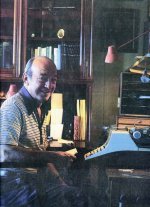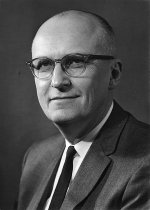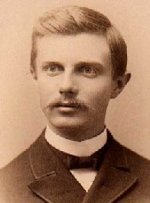
The Intellectual Menopause and Changing One's Major
A luncheon address presented at the Pacific Northwest History Conference, Corvallis, Oregon. April 26, 1986.
There's a delightful essay waiting to be written about historians who remain at professional meetings with a Saturday luncheon meeting. I have myself been tempted by the subject. It would seem to offer a marvelous opportunity to combine black humor with proof positive of the theory of multiple causation. Even so I will honor my announced intention to explore the apparently equally esoteric subject of the intellectual menopause and changing one's major.
The title may suggest one of two things: either I am being flippant on the eve of retirement, or I am indulging myself with selected memories about a mid-life crisis. I must disappoint you. I did choose the title with a dollop of impish pleasure. It was fun. But I propose to talk about two very serious and interrelated matters. I will offer one primary proposition and then explore two of its implications. The axiom is that our historical training has become too narrow, programmed to pursue one subject and hence places us at risk of becoming satiated and bored with our expertise. I have an uneasy sense that we are becoming not all that much different than the engineers and the others we love to hate. Along with them we appear more and more like an angel contemplating a missile or a hangnail on the point of a pin. Over the last decade, for example, I have studied a sizable number of dossiers prepared by historians applying for jobs at Oregon State and several other colleges and universities around the country. I was first surprised and then increasingly disturbed by the limited range of their basic historical training, and by how many of their credits were accumulated under the rubric of "thesis." During those same years I also served as an outside reader on various Ph.D. theses and for several publishers. My conclusions were similar - various, rather obvious connections, interrelationships, and even related evidence were simply ignored. There were none of those classic footnotes that can become the text itself.
Those and related experiences pushed me back to the thoughts I had expressed earlier in an essay called "History as a Way of Learning." Many of those ideas had emerged from having been trained and having functioned for eight years as a kind of multi-purpose engineer, father confessor, and politician in two small communities, and, at that point, choosing to become an historian in what was then the most rigorous program in the United States. Hence "History as a Way of Learning" came to me to mean several things with attendant consequences. First, it involved a broad acquaintance with the history of many cultures and countries, an awareness gained in seminars as well as in lecture courses dealing with non-American history. Second, it meant an understanding of historical methodology that drew upon the key figures of economics, political theory, literature, and social psychology, as well as upon the contentious giants of history. Doing history meant 18 hour days, seven days a week. History was defined and presented as a way of integrating human experience rather than a way of specializing in one aspect of life. The point being that learning how to do history enabled one to make sense of life as a citizen as well as a professor. It is of course true, that one has to start somewhere with the practical matter of doing history. The master's essay and the Ph. D. dissertation are for that purpose probably as good a way as has been devised. But it is crucial to do that kind of history with the broadest possible background, and then go on to do other kinds of history - all the while extending, constantly, extending one's background.
There are several consequences if we fail by training, or by example, or by both to go on to do other kinds of history. We lose our sense of wonder, we become content with certainties about minuscule subjects, and hence we lose our excitement for the unknown. We choose safety instead of challenge. We accept conventional wisdom outside our specialties, which is almost by definition a denial of being an historian - to accept conventional wisdom. We forget that it is at least as important to ask the right questions as it is to provide prize winning answers. We cease to have fun - what a terrible word to use - we cease to have fun. We lose our sense of play. We forget Auden's great line, "A poet is a man [or a woman] who asks the question 'What if?'" What if? How else can you be an historian if you don't ask that question? What if? We come to be parochial, we come to be clannish, we come to be cranky, and ever more a special interest group. I'm going to risk suggesting that Peter Matthiessen, the man who sought the white leopard, has something to say in his book that I bought yesterday and read last night - "just face this great city and see whether it conquers you or you conquer it." More bluntly, to poke a finger through the wall is not enough; the whole wall must be brought down with a crash. If we do not do these things we become less effective as teachers and as citizens. As a result we have less and less and less to offer to our fellow Americans. To the extent that they read history, they do so more and more as an escape from reality, rather than as a thought, decision, and responsible action in this world. In a very real sense, therefore, we do possibly, in truth, face an intellectual menopause which confronts us with the need to rethink our priorities and our purposes. One is sometimes inclined to think that all American history survey courses ought to begin with Thucydides, Alice's Adventures in Wonderland, and Through the Looking Glass before going on to John Winthrop, James Madison, and John Quincy Adams. Having taught Western Civilization many years at such enlightened institutions as Ohio State University, I could offer the same suggestions for Western Civilization.
I am not arguing - and don't charge me with same - I am not arguing that all history produced during the last 35 years is second-rate, mundane, or useless. We all know that much of it extends our knowledge of something or other and that some of it offers insight, analyses, interpretations pointing toward a new and creative synthesis of the American experience; for making sense of who we are, who we have been and where the hell we're going. What I am saying [is] that we need to educate ourselves first, and our students and our neighbors beyond the confines of our specialties. We need to talk seriously about the intellectual and public purposes of history. It's not a little secret we have, you know. We have this public responsibility. We are charged with making sense out of reality. There is no other meaningful definition of being an historian. We need individually to change our majors, to explore and think and teach about different subjects. We must dare to fail, damn it. We must dare to fail. We must risk being another Henry Adams. We must risk being another F. O. Matthiessen, another Henry Nash Smith, another Wright Morris, another William Carlos Williams, even a Gore Vidal. It can be done, and it has been done. I repeat, it can be done, and it has been done.
Consider first an institutional example. Between the day that Frederick Jackson Turner left the University of Wisconsin in 1910 and the end of World War II, the history department transformed its curriculum to produce graduates who were expected to invest as much of their energy and intelligence on the history of Europe and other areas and other disciplines as upon American history. That meant, for example, that William Best Hesseltine explored the usefulness of psychology and psychoanalysis in understanding individual leaders long before those approaches became a methodological cult among historians. Best Hesseltine wrote sparkling essays on regional living, that he combined social psychology, literature, and the concept of a Weltanschauung with a knowledge of European history to offer a classic essay on the four basic traditions that shaped American culture: the trustee, the squire, and so on. If you've never read it, I assign it. It also meant that Fred Harvey Harrington wrote a marvelous non-fiction novel about a hanging judge in Arkansas long before Truman Capote and Norman Mailer claimed to have invented the genre. And Harrington also wrote one of the most sophisticated, classical studies of American imperialism in the Far East. Both men, as well as their colleagues, also regularly taught undergraduates.
It is easy to say that people like Hesseltine and Harrington and their colleagues are exceptional. There's a temptation to say they're unique. That the rest of us ordinary mortals cannot be expected to perform at that level. The argument misses the point, and indeed it is kind of a self-serving safety valve. The issue is that they did; they did institutionalize their understanding of the nature and the purpose of history and thereby encourage the rest of us not to get stuck in the ruts of our first specialties. By word and deed, by example and program, they insisted that doing history - I repeat, they insisted that doing history - was a vital part of making sense out of anything, even Ronald Reagan - even Ronald Reagan. I would just love to read Hesseltine on Ronald Reagan. They did create a pressure cooker, true - they did. More than a few exceptional historians shied away from that challenge.
Maybe Frederick Jackson Turner saw the handwriting on the wall; maybe that is why he left Wisconsin for Harvard. Whatever the cause, it is clear enough that Turner experienced his own intellectual menopause. Turner did make a few efforts to move beyond his justly famous and vitally important 19, I mean 1893 essay on the frontier thesis. It has informed all our understanding of America. Turner even tried to use that himself - as the gentleman on my right [Donald Worster] pointed out last night - to write a few essays in The Atlantic Monthly on what that meant. What are the options? But in the end Turner went off to sit in the sun on a park bench in Cambridge. The man who said "Go West," went East. Fair enough, fair enough. For that matter I'm sure that all of us would like to have been privy to Turner's regular conversations with Brooks Adams sitting out there in the yard at Harvard about the implications of their different versions of the frontier thesis. Because Brooks Adams and Frederick Jackson Turner arrived at the same conclusion independently, from completely different backgrounds. Fascinating. One of the great moments in American historiography: you get the same book written by two people at the same time. Fascinating. So they sat there on the park bench - this is true - they sat there on the park bench, and they talked about it. You might even speculate that Frederick Jackson Turner influenced Brooks Adams's neglected study of the theory of social revolutions. But the truth remains, that as far as being an historian, Turner packed in. Not so with Charles Austin Beard. Strongly grounded in European, as well as American history. Beard faced his intellectual crisis at Columbia in 1917. He did not go off to a prestigious sinecure. Instead Beard helped found the New School for Social Research, went off to learn things from the Japanese, and inserted the methods and insights of history into the dialogue about public affairs during the remainder of his life. Beard changed his major many times in a valiant effort to sustain history as a way of making sense out of American life and world politics.
You might consider that all I have said is a call for a modern version of [Charles Beard's] The Rise of American Civilization. We do need one, but you can be sure that we will not achieve it unless we get on beyond our contemporary intellectual menopause by breaking free of our specialties, by changing our majors. I go back to Peter Matthiessen - to poke a finger through the wall is not enough, the whole wall must be brought down with a crash.
Thank you.
Table of Contents
- The Politics of Ecological Balance
- Seven Americas on the Way to the Future: An Exploration of American History
- The Crisis of American Democracy
- The Legacy of Karl Marx: Or, the Inheritance We Dare Not Squander
- The Intellectual in American Public Life
- Commencement Address
- Fred Harvey Harrington: Committed, Tough and Foxy Educator and Liberal.
- The Intellectual Menopause and Changing One's Major
- The Comparative Uses of Power: China on the African Rim and the United States on the Pacific Rim
- Harvey Goldberg and The Virtue of History
- Vietnam and the Revival of An Anti-Imperial Mood and Movement In the United States and the Beginnings of a Thaw in The Cold War.
- America As a Weary and Nostalgic Culture
- The Potential of Higher Education




